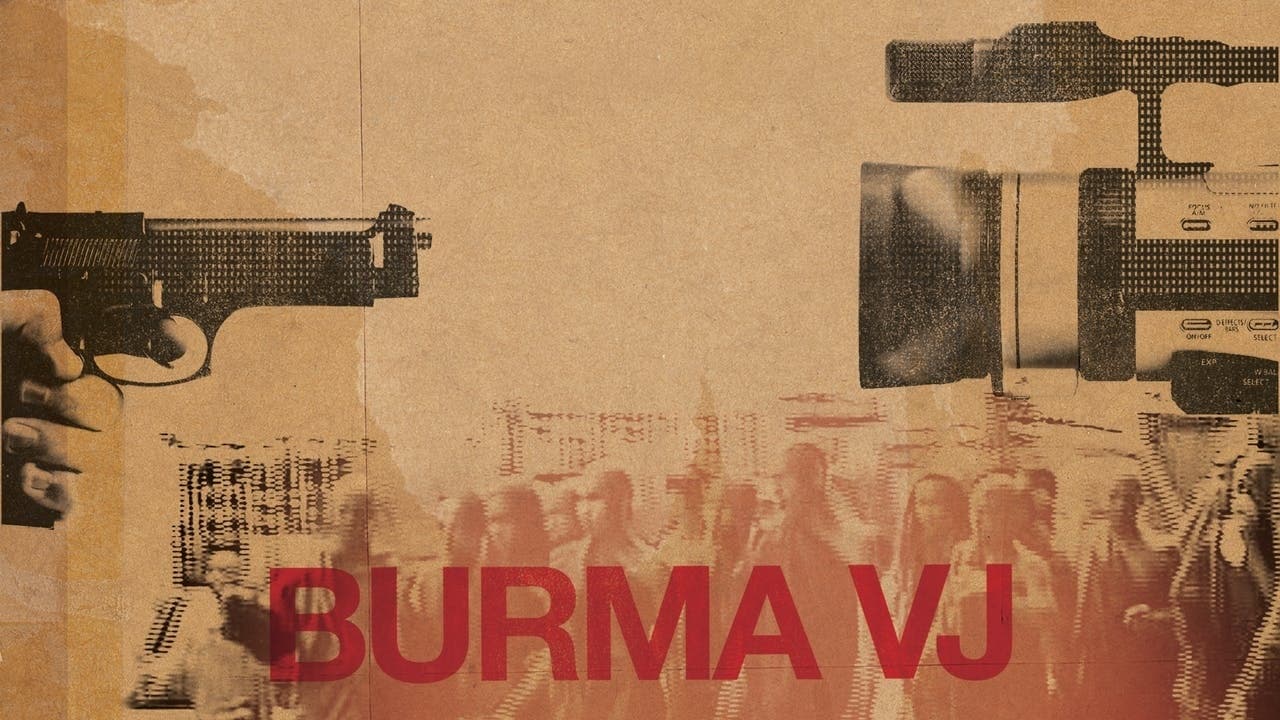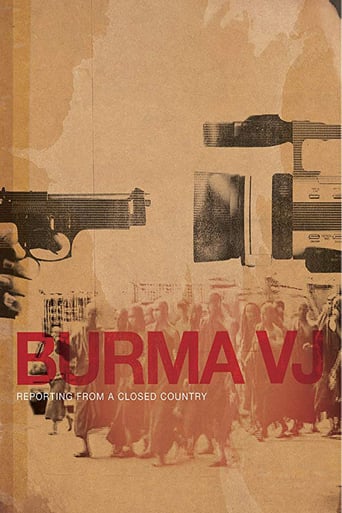

Why so much hype?
... View MoreThe Worst Film Ever
... View MoreDreadfully Boring
... View MoreAdmirable film.
... View MoreIn 1962, the Burmese government was overthrown in a coup by the socialist military, who maintained control of the country until 2011. During this time, Burma deteriorated into poverty, while any protests or statements made against the ruling government were quickly crushed through intimidation, torture, outlandishly long jail sentences and executions. In 1988, a series of marches, rallies and protests now known as the 8888 Uprising were brought to a bloody end as the military killed 3,000 civilians in the streets.With the media controlled by the state and a ban on any footage leaving the country, the Democratic Voice of Burma (DVB) has trained its journalists to work as guerrilla cameraman, working in the shadows to capture any acts of oppression or revolution. They work as a network but rarely meet, communicating using mobile phones and internet chatrooms, and frequently putting themselves at great personal risk. Being captured could mean death, with our narrator, known as 'Joshua', having his footage wiped early on by secret police and being forced into exile. Clever reconstructions of Joshua receiving updates on a new uprising now known as the Saffron Revolution, led by the Buddhist monks, forms a tense narrative.The footage captured by the DVB is astonishing, with the action taking place right before your eyes. It is also, at times, incredibly intimate. Early on, the monks distrust the DVB, suspecting they are secret police. When the cameramen are attacked by plain-clothes military, the monks protect them and trust is immediately solidified. You are instantly swept up by the protesters elation and feel their incredible sense of hope, so it's absolutely shattering to see it all torn away. Director Anders Ostergaard weaves the footage together expertly, and the film is wholly deserving of its Best Documentary nomination at the Academy Awards in 2010 (and probably deserved to win). It's as close as you could get to being on the streets of a country under a crushing regime, and the results are frustrating and terrifying.
... View MoreIts 1988 in Burma. Students are leading a series of vociferous protests against the military junta. Years of economic mismanagement have been compounded by the sudden cancelling of some of the nation's currency notes - savings held in cash are instantly wiped out. The shooting of an engineering student in March leads only to louder and larger protests; a young woman by the name of Aung San Suu Kyi becomes the face of the democracy movement. Then, on September 18, the Army steps in - over 3,000 are killed or disappeared in one afternoon.Fast forward to 2007, and Joshua, the underground reporter and narrator of Ostergaard's 'Burma VJ' is getting deja vu. Economically on its knees, with high unemployment, rising inflation and subsidies being cut, and politically running out of options, the Burmese people are suffering. As one of a number of journalists working illegally for the Democratic Voice of Burma (DVB), a television and radio network-in-exile (based in Norway), Joshua risks his freedom and life to document conditions inside the country under the despotic rule of the junta. Once smuggled out of the country, images and videos are edited and streamed back into Burma via radio networks, or passed onto international news networks to raise awareness.In late 2007, Joshua and his DVB colleagues noticed a shift in popular opinion. The fears of a recurrence of 1988 were subsiding, a combination of the natural amnesia of time and the desperation of quotidian life. Small, isolated protests were occurring. They were quickly broken up by the junta's 'thugs' but not before being captured by the diligent DVB reporters. Then, and most famously, the monks took to the streets; occupying a precious place in Burmese and Buddhist society, monks are not to be harmed and therefore presented a literal human shield for the thousands of Burmese citizens who took to the streets to protest alongside them.The bloody conclusion to the uprising thereafter is well-known, as is the infamous execution-like shooting of the Japanese journalist Kenji Nagai. What Ostergaard adds to the saga however is to point out the courage of those behind the footage (it was a DVB reporter that captured the Nagai shooting for example, from a nearby building), who risk their lives so that the bravery of those protesting is not lost with the first firing of the army's guns. The 2007 uprising, however brutally put down, was a defeat for the junta due almost entirely to the reporting of DVB reporters, like Joshua, who put themselves in positions similar to Nagai in order to document the democratic desire of their people.Concluding Thought: Hard to know who to admire more, the monks willing to die for the sake of their people, or the reporters willing to die to document it.
... View MoreTo create that sense of realism, tension and excitement even, the fad nowadays is for filmmakers to employ the use of the nausea-inducing shaky cam. For the multiple, independent video journalists in Burma documenting instances of oppression and suppression, crying for the attention of the outside world, it's not a technique used for vanity or stylistic reasons, but one stemming from sheer necessity. One can imagine if one is caught with a video camera recording street arrests and such, where the penalty would likely be endless interrogation, to put it mildly, and probably being conveniently forgotten."Joshua" and his crew from DVB – Democratic Voice of Burma – a group of clandestine journalists operating from within Burma, had plenty of footage that they manage to smuggle out of the country, either through online means, or trusted couriers, where news networks had used to tell of the plight of street protesters in September 2007. Utilizing small consumer cameras hidden in bags and whisked in and out for clips lasting seconds, you can feel that real sense of danger that these folks go through just to get actual ground conditions to the outside world.Director Anders Østergaard had assembled various clips from that fateful event where the monks took to the streets, which for days an unexpected non-response from the military government provided that spark of optimism that change was coming. For those familiar with the aftermath from that affair, watching this on hindsight made one feel a little saddened even, because we know what would be coming up next. With some moments re- enacted and spliced together with actual footages, Burma VJ became a riveting documentary where the draw is having to become a witness to what's happening on the ground being in stark contrast to official state media's interpretation, and perhaps to think about how an event as this one shouldn't be allowed to just fade away.And the footages are nothing short of amazing, astounding, and shocking even. There was a progression of sorts technically, probably stemming from collective courage of the masses where temporal point-and-shoot strategies gave way to lengthy unflinching recordings. From the journalists' first hand accounts as seen through their viewfinders, we take to the streets with them in a "people power" movement, even going right up to the villa where Aung San Suu Kyi was held under house arrest, appearing to greet the monks. We also get a sense of how the military's strength in numbers were called upon to cordon off areas and provided a standoff with their weapons locked and loaded, and executions at point blank were all caught on camera, from grainy digital zooming of lens watching from afar.In some ways, the film progressed as per how the movement gained momentum, in a slow brew of relatively smaller demonstrations to a frenetic charge toward large masses, before night time raids and arrests of the protesting monks led to a systematic fizzling of drive and ultimate dispersal, and the flight for cover, as the DVB journalists had to lay low following crackdown by the secret police. For the superstitious as the military junta is touted to be, there's a quick mention of Typhoon Nargis too, which I recall when it struck had many tongues wagging that it was a celestial response to what was done to the monks, here in a scene that I've never seen, a lifeless body floating on a river with a cracked skull.Burma VJ is a powerful documentary, and I do urge anyone who has the chance to watch this, to give it a go.
... View MoreThe Western world concerns itself with issues like that of bias in the media. In Burma, journalism is illegal. The impact of "Burma VJ" is pretty straightforward. These VJs, living under a militaristic government, risk their lives to get footage of the crimes against humanity in their country--the killing of Buddhist monks, the extreme crowd control--and smuggle it out so the world can see (as well as back into Burma to counteract the government's propaganda).It's hard to get a sense of just what director Anders Ostergaard brings to this story as he creates a film: his greatest achievement is that he simply lets his source, named Joshua, tell his story. The issue speaks for itself and the footage these daring citizens capture is plenty to awaken anyone unaware of the situation in Burma to the tragedy there.Certain parts are more compelling than others, but in general, "Burma VJ" executes to the fullest what every good documentary should: enlighten. The film's impact goes a bit beyond into the realm of courage and sacrifice of the citizen to stand up to wrongdoing in his or her country--certainly unique in that this comes to light through illegal journalism--but mostly you are left with becoming aware and upset that a government would treat its people this way, glad to live somewhere where journalism is an institution. Suddenly the conflict we see every day between the media and establishment seems so totally insignificant. It's a reminder of how important the work of the journalist is and how it's a privilege to have in a country, which ultimately is about the privilege of being free in a country. ~Steven CVisit my site at http://moviemusereviews.com/
... View More